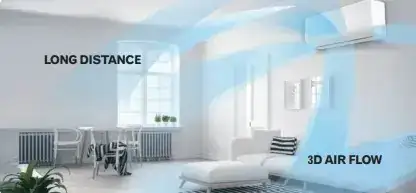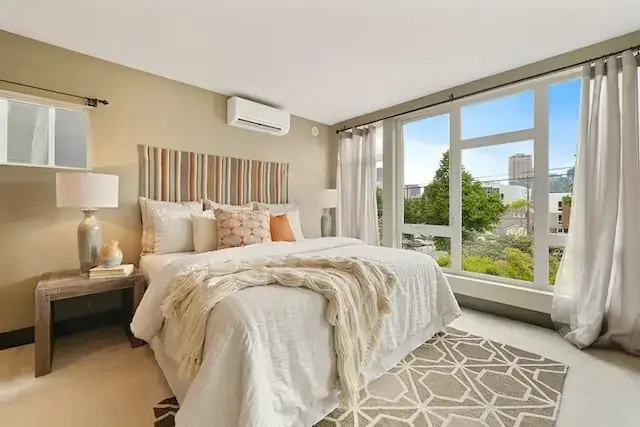What size air conditioner do I need
Information to help you make the right choice
Buying and installing air conditioning in your home can be a significant investment which is why it’s essential to choose the right system. Whether you are upgrading your existing AC or making a first-time purchase it is important to take into consideration some key considerations. Installing an air conditioner is not always a luxury and can be considered a necessity in some regions of Queensland due to the hot humid climate. It's important to also consider that air conditioning is an investment that will not only give you the perfect indoor climate control but will also add to the value of your property. When you have the correct size and style installed either in your home or business you can enjoy a comfortable and energy-efficient environment

Consider your property characteristics
The design and characteristics of your home or the building you live in will have a significant bearing on what size and style of air conditioner you choose. To help make an informed decision start with calculating the cooling capacity required for your space and considering additional factors such as climate, energy efficiency, noise level, and brand quality. Installing the correct size air conditioner will provide complete climate control comfort, energy efficiency, longevity, precise temperature and humidity control, cost savings, and a positive environmental impact.
So breaking it down an air conditioning system that might be ideal for a small apartment in a multi-story building is more than likely NOT suitable for a sizeable stand-alone house. For instance, a ducted air conditioning system will not be suitable for homes with no ceiling void (space between the ceiling and the roof) as this system needs space for the ducts and indoor units. Apartments in multi-story buildings can have the option to be fitted with a bulkhead unit or wall-mounted split system style aircon. It's also important to take into account which areas will require heating or cooling. Are you needing climate control solutions for your whole household or just specific rooms? Take into consideration: /p>
Size - room size (width & length) as well as ceiling height
Flooring - the flooring material can affect the recommended aircon size eg tiled floors can be cooler needing an increased heating function.
Aspect - full morning or afternoon sun can put pressure on the cooling system requiring more power (larger system) to maintain cooling.
Insulation - ceiling and/or wall insulation, as well as other features such as window coverings, awnings, shading trees, double glazing, and eves, can passively keep heating or cooling in & weather out, reducing your home climate control needs.
Key factors to consider
We’ve put together this list of points to consider when selecting an air conditioning system so your home or office has its climate control needs met.
- Calculate the Cooling Capacity Needed: you can then check this against the manufacturer's product information, alternatively, you can seek assistance from an air conditioner specialist.
- Consider room characteristics: Adjust the cooling capacity based on factors such as room orientation, ceiling height, insulation, and the number of occupants. For example, if the room receives direct sunlight or has poor insulation, you may need to increase the cooling capacity by 10-20%.
- Climate: If you reside in a hot and humid climate, you may want to opt for a slightly larger unit to handle the increased cooling demand.
- Energy Efficiency: Look for air conditioners with high energy efficiency ratings (EER or SEER) to ensure cost-effective cooling. Energy-efficient units may have lower cooling capacities but can still cool effectively.
- Noise Level: Consider the noise level of the air conditioner, especially if you plan to install it in a bedroom or study. Check the decibel ratings of various models and choose one that suits your preferences.
- Brand and Quality: Select reputable brands known for their reliability and durability. Investing in a high-quality unit can save you money in the long run by reducing maintenance and replacement costs.

Air conditioner styles explained
Manufacturers have developed several main air conditioner styles to ensure they offer a practical solution for all applications. Each of these styles offers cool-only or reverse-cycle models. To help determine which style will best suit your needs, a good starting point is to take into consideration your climate. If we look at southern Queensland, the winters can be cold and the summers very hot and humid making reverse cycle air conditioning the logical choice. The warmer areas of Australia may opt for cool-only models to provide comfort during the summer heat with mild winters not really calling for heating.
Reverse cycle air conditioning
A reverse cycle air conditioner, also known as a heat pump, is an air conditioning system that can both cool and heat a space. It offers the ability to reverse its refrigeration cycle, allowing it to provide both cooling during hot weather and heating during cold weather. Reverse-cycle air conditioners are typically more expensive upfront compared to single-purpose cooling systems. However, their long-term energy savings and year-round functionality make them a popular choice for those seeking both cooling and heating solutions in a single unit.
Single split system air conditioning
A split system air conditioner also known as a ductless air conditioner or ductless mini-split is a type of air conditioning system that consists of two main components: an indoor unit and an outdoor unit. It is designed to provide cooling (and sometimes heating) to specific zones or rooms in a building without the need for extensive ductwork. Split system air conditioners are popular for residential homes, apartments, offices, and commercial spaces where individual temperature control and energy efficiency are desired. Their versatility, ease of installation, and ability to provide both cooling and heating make them a flexible and convenient air conditioning solution.
Multi-split system
A multi-split system air conditioner, also known as a multi-zone system, is a type of air conditioning system that consists of one outdoor unit connected to multiple indoor units. It is designed to cool or heat multiple rooms or zones within a building independently. Unlike the single-split system AC that has one indoor unit and one outdoor unit, with the multi-split system you have one outdoor unit connected to two or more indoor units allowing for simultaneous cooling or heating in different areas of your home or business.
Ducted air conditioning systems
Ducted air conditioning is a type of central air conditioning system that provides cooling and heating to an entire building or multiple rooms through a network of ducts. It is designed to deliver conditioned air to different areas of a building through vents or diffusers installed in the ceilings or walls. Ducted air conditioning is commonly used in larger residential homes, commercial buildings, offices, and other spaces where centralized control and uniform climate control are desired. Professional design and installation are essential to ensure optimal performance, efficiency, and comfort.
Leading Air Conditioner brands
- ActronAir
- Daikin
- Fujitsu
- Mitsubishi
- Panasonic
- Mitsubishi Heavy Industries ( MHI)
- Temperzone
- Toshiba
- MDV
- Gree
- Haier
The benefits of Installing the correct size AC unit
- Comfort: A properly sized air conditioner ensures that your indoor space remains cool and comfortable, especially during hot and humid weather. It helps regulate the temperature, reduce humidity, and create a pleasant living or working environment for occupants.
- Energy Efficiency: An accurately sized air conditioner operates more efficiently, leading to energy savings. Undersized units may struggle to cool the space, running continuously and consuming more energy. Oversized units, on the other hand, tend to cycle on and off frequently, wasting energy. By choosing the right size, you optimize energy usage and reduce utility bills.
- Longevity: Air conditioners that are correctly sized for the space tend to have a longer lifespan. They don't have to work as hard to cool the area, reducing wear and tear on the components. Additionally, properly sized units are less prone to breakdowns and can handle the cooling demands effectively, extending their operational life.
- Temperature Control: A properly sized air conditioner allows for precise temperature control. It can maintain a consistent and comfortable temperature throughout the space, ensuring that occupants are neither too hot nor too cold. This is particularly important in areas where temperature fluctuations can affect productivity or well-being.
- Humidity Control: Air conditioners also play a vital role in controlling indoor humidity levels. Excess humidity can lead to mold growth, musty odors, and discomfort. A correctly sized unit effectively removes moisture from the air, maintaining optimal humidity levels for a healthier and more pleasant indoor environment.
- Cost Savings: Choosing the right size air conditioner can result in long-term cost savings. Energy-efficient units with accurate cooling capacities consume less electricity, lowering your utility bills. Additionally, properly sized units require fewer repairs and replacements, reducing maintenance costs over time.
- Environmental Impact: Energy-efficient air conditioners not only save you money but also contribute to a greener environment. By reducing energy consumption, you decrease the carbon footprint associated with cooling your property.
No need to guess
There is no doubt that trying to work out which air conditioner system will be the best suited for your office or home can be a little daunting and somewhat confusing. You might be tempted to just guess the size you will need, but rest assured if you don't take the important aspects into consideration you will more than likely encounter problems. That's where the air conditioning specialists can come to your aid, they can access your space, consider various important factors and provide expert recommendations based on your specific requirements. If you install an AC unit that is too big it can waste energy over cooling or heating the space. Alternatively, one that is too small will need to work overtime using excess energy to cope.

Trusted Air Conditioning Specialists
Sea Air Air conditioning technicians have a wealth of knowledge with air conditioning, we can assist with your aircon questions or specific AC needs simply call 0401 787 183 to speak to one of our team. Our services cover areas including Brisbane, Sunshine Coast, Moreton Bay, Gympie, and the Gold Coast.
References - https://www.choice.com.au/home-and-living/cooling/air-conditioners/buying-guides/air-conditioners



